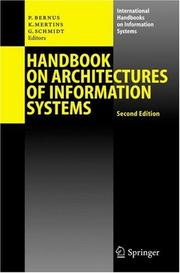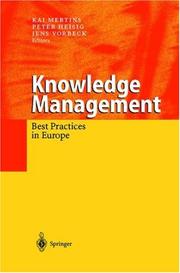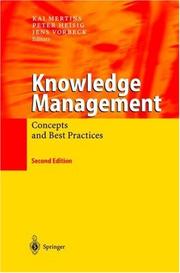| Listing 1 - 10 of 19 | << page >> |
Sort by
|
Book
ISBN: 1280623187 9786610623181 3540275193 Year: 2004 Publisher: Berlin : Springer,
Abstract | Keywords | Export | Availability | Bookmark
 Loading...
Loading...Choose an application
- Reference Manager
- EndNote
- RefWorks (Direct export to RefWorks)
Als erstes deutschsprachiges Werk zum Thema Wissensbilanzierung ist dieses Buch unentbehrlich für Entscheider in Unternehmen und öffentlichen Institutionen, die sich mit der Steuerung und Kommunikation der wichtigsten Ressource der Zukunft, dem Wissen, auseinandersetzen wollen. Das Buch gibt einen umfassenden Überblick über das neue Thema und beinhaltet neben einer allgemeinen Einführung vor allem praktische Ergebnisse und Fallstudien von Anwendern. Es wurde geschrieben von führenden Experten der Wissensbilanzierung, verantwortlich für deren Entwicklung und Umsetzung in verschiedenen Organisationen. Interessierten Wissenschaftlern und Studierenden vermittelt das Buch Kenntnisse über die derzeit wichtigsten Methoden und zentralen Erfahrungen mit Wissensbilanzen in Europa.
Management. --- Accounting. --- Bookkeeping . --- Organization. --- Planning. --- Accounting/Auditing. --- Strategic planning.
Book
Year: 1999 Publisher: Boston Kluwer
Abstract | Keywords | Export | Availability | Bookmark
 Loading...
Loading...Choose an application
- Reference Manager
- EndNote
- RefWorks (Direct export to RefWorks)
Book
ISBN: 1282019678 9786612019678 3540693637 Year: 2009 Publisher: Berlin : Springer,
Abstract | Keywords | Export | Availability | Bookmark
 Loading...
Loading...Choose an application
- Reference Manager
- EndNote
- RefWorks (Direct export to RefWorks)
Im Umfeld globaler und sich schnell wandelnder Märkte kommt der gezielten Nutzung des Unternehmenswissens eine wachsende Bedeutung zu. Doch Wissensmanagement muss nicht hoch komplex und theoretisch sein, wie die vorliegende Publikation beweist. Dieses Buch liefert Ideen und Hinweise für die Gestaltung des Wissensmanagements in Unternehmen und verdeutlicht dies anhand von 15 Unternehmensbeispielen. Erfahrungen und Erfolge, die in der Praxis erzielt wurden, werden verständlich und praxisorientiert beschrieben und vermitteln dem Leser, wie der Produktionsfaktor Wissen innerhalb der Geschäftsprozesse besser genutzt werden kann. Die vorliegende Publikation stellt 15 mittelständische Fallbeispiele zur pragmatischen Verbesserung des Umgangs mit Wissen vor. Die 15 Unternehmen haben mit Hilfe der Fraunhofer-Institute IFF und IPK genau dort angesetzt, wo die größten Verbesserungspotenziale liegen: an den wertschöpfenden Geschäftsprozessen. Mit einfachen, mittelstandstauglichen Methoden, Instrumenten und Hilfsmitteln wurde der Umgang mit Wissen optimiert. Hartmut Schauerte MdB, Parlamentarischer Staatssekretär beim Bundesminister für Wirtschaft und Technologie, Mittelstandsbeauftragter der Bundesregierung ProWis hat uns geholfen eine Initiative zur Mitarbeitermotivation einzuführen, die ein Umsatz- und Produktivitätswachstum verwirklichte, das ich nicht für möglich gehalten hätte. Trotz eines Schichtmodells, das hart an die Grenze zum Machbaren geht, rechnen wir monatlich 2,5 Mal so viel ab, wie geplant. Frank Krautwer, Geschäftsführer PM Automotive GmbH Die beschriebenen Beispiele verdeutlichen, wie wichtig es ist, im Wissensmanagement die drei Ebenen „Mensch, Technik und Organisation" zu verknüpfen. Methoden und Werkzeuge müssen auf allen drei Ebenen ansetzen, um wirklich produktiv zu sein; eine Fokussierung auf Informationstechnologie allein wäre auf Dauer nicht erfolgreich genug. Lassen Sie sich von den Beispielen und Methoden für Ihr eigenes Wissensmanagement inspirieren. Hans-Jörg Bullinger, Präsident der Fraunhofer-Gesellschaft.
Leadership. --- Organization. --- Planning. --- Management. --- Psychotherapy . --- Business Strategy/Leadership. --- Psychotherapy. --- Knowledge management. --- Small business. --- Business planning.

ISBN: 1281329355 9786611329358 3540266615 3540254722 9783540254720 Year: 2006 Publisher: Berlin ; New York : Springer,
Abstract | Keywords | Export | Availability | Bookmark
 Loading...
Loading...Choose an application
- Reference Manager
- EndNote
- RefWorks (Direct export to RefWorks)
This book is the first volume of a running series under the title International Handbooks on Information Systems. The series is edited by Peter Bernus, Jacek Blazewicz, Günter Schmidt and Mike Shaw. One objective is to give state of the art surveys on selected topics of information systems theory and applications. To this end, a distinguished international group of academics and practitioners are invited to provide a reference source not only for problem solvers in business, industry, and government but also for professional researchers and graduate students. It seemed appropriate to start the series with a volume covering some basic aspects about information systems. The focus of the first volume is therefore architectures. It was decided to have a balanced number of contributions from academia and practitioners. The structure of the material follows a differentiation between modelling languages, tools and methodologies. These are collected into separate parts, allowing the reader of the handbook a better comparison of the contributions. Information systems are a major component of the entire enterprise and the reader will notice that many contributions could just as easily have been included in another volume of the series which is on enterprise integration. Conversely, some traditionally information systems topics, as organizational analysis and strategic change management methods, will be treated in more depth in the Handbook on Enterprise Integration. The two volumes will complement each other.
Computer architecture. --- System design. --- Information technology. --- IT (Information technology) --- Technology --- Telematics --- Information superhighway --- Knowledge management --- Design, System --- Systems design --- Electronic data processing --- System analysis --- Architecture, Computer --- Information systems --- Computer architecture. Operating systems --- Computer network architectures. --- Information Systems. --- Computer System Implementation. --- IT in Business. --- Information Systems Applications (incl. Internet). --- Management of Computing and Information Systems. --- Architectures, Computer network --- Network architectures, Computer --- Computer architecture --- Architecture, Computer. --- Business—Data processing. --- Application software. --- Management information systems. --- Computer science. --- Informatics --- Science --- Computer-based information systems --- EIS (Information systems) --- Executive information systems --- MIS (Information systems) --- Sociotechnical systems --- Information resources management --- Management --- Application computer programs --- Application computer software --- Applications software --- Apps (Computer software) --- Computer software --- Communication systems

ISBN: 3540674845 9783540674849 Year: 2001 Publisher: New York Springer
Abstract | Keywords | Export | Availability | Bookmark
 Loading...
Loading...Choose an application
- Reference Manager
- EndNote
- RefWorks (Direct export to RefWorks)
Knowledge management --- Knowledge management. --- #SBIB:309H1720 --- #SBIB:35H34 --- #SBIB:35H302 --- Management of knowledge assets --- Management --- Information technology --- Intellectual capital --- Organizational learning --- #SBIB:35H304 --- Informatiekunde, informatie management --- Organisatieleer: omgeving --- Organisatieleer: processen
Digital
ISBN: 9783540266617 Year: 2006 Publisher: Berlin, Heidelberg Springer-Verlag Berlin Heidelberg
Abstract | Keywords | Export | Availability | Bookmark
 Loading...
Loading...Choose an application
- Reference Manager
- EndNote
- RefWorks (Direct export to RefWorks)

ISBN: 3540004904 Year: 2003 Publisher: Berlin Springer
Abstract | Keywords | Export | Availability | Bookmark
 Loading...
Loading...Choose an application
- Reference Manager
- EndNote
- RefWorks (Direct export to RefWorks)
Book
ISBN: 3662492202 Year: 2016 Publisher: Berlin, Heidelberg : Springer Berlin Heidelberg : Imprint: Springer Gabler,
Abstract | Keywords | Export | Availability | Bookmark
 Loading...
Loading...Choose an application
- Reference Manager
- EndNote
- RefWorks (Direct export to RefWorks)
Der gezielten Nutzung des Unternehmenswissens kommt eine wachsende Bedeutung zu. Doch Wissensmanagement muss nicht komplex und theoretisch sein, wie die vorliegende Publikation beweist. Dieses Buch liefert Ideen und Hinweise für die Gestaltung des Wissensmanagements und verdeutlicht dies anhand von Praxisbeispielen. Das bewährte Vorgehen, welches in der 1. Auflage bei 15 produzierenden Mittelständlern beschrieben wurde, konnte inzwischen auch auf öffentliche Institutionen, größere Unternehmen, Netzwerke und Dienstleister angewandt werden. Diese Erfahrungen und Erfolge aus der Praxis werden verständlich und praxisorientiert beschrieben und vermitteln dem Leser, wie der Produktionsfaktor Wissen effizient genutzt werden kann. Der Inhalt: Strategisches und operatives Wissensmanagement Einführung von Wissensmanagement in Organisationen Den Status quo im Umgang mit Wissen erkennen Wissensorientierte Analyse und Gestaltung von Geschäftsprozessen Neun Wissensmanagement-Lösungen: Methoden und Instrumente Zwölf Wissensmanagement-Fallstudien aus der Praxis Die Herausgeber: Prof. Dr.-Ing. Holger Kohl ist Leiter des Fachgebiets „Nachhaltige Unternehmensentwicklung“ an der Technischen Universität Berlin. Als Nachfolger von Prof. Dr.-Ing. Kai Mertins ist er ferner für das Geschäftsfeld „Unternehmensmanagement“ am Fraunhofer IPK verantwortlich. Dipl.-Ing. Holger Seidel leitet das Geschäftsfeld „Logistik- und Fabriksysteme“ am Fraunhofer IFF in Magdeburg. .
Leadership. --- Organization. --- Planning. --- Business Strategy/Leadership.
Book
Abstract | Keywords | Export | Availability | Bookmark
 Loading...
Loading...Choose an application
- Reference Manager
- EndNote
- RefWorks (Direct export to RefWorks)
Book
ISBN: 3319309579 3319309560 Year: 2016 Publisher: Cham : Springer International Publishing : Imprint: Springer,
Abstract | Keywords | Export | Availability | Bookmark
 Loading...
Loading...Choose an application
- Reference Manager
- EndNote
- RefWorks (Direct export to RefWorks)
A concise reference to the state of the art in systems interoperability, Enterprise Interoperability VII will be of great value to engineers and computer scientists working in manufacturing and other process industries and to software engineers and electronic and manufacturing engineers working in the academic environment. Furthermore, it shows how knowledge of the meaning within information and the use to which it will be put have to be held in common between enterprises for consistent and efficient inter-enterprise networks. Over 30 papers, ranging from academic research through case studies to industrial and administrative experience of interoperability show how, in a scenario of globalised markets, where the capacity to cooperate with other organizations efficiently is essential in order to remain economically, socially and environmentally cost-effective, the most innovative digitized and networked enterprises ensure that their systems and applications are able to interoperate across heterogeneous collaborative networks of independent organizations. This goal of interoperability is essential, not only from the perspective of the individual enterprise but also in the business structures that are now emerging, such as complex collaborating networks of suppliers and customers, virtual enterprises, interconnected organisations or extended enterprises, as well as in mergers and acquisitions. Establishing efficient and relevant collaborative situations requires the management of interoperability from a dynamic point of view: a relevant and efficient collaboration of organizations may require adaptation to remain in line with changing objectives, evolving resources, unexpected events, etc. Many of the papers contained in this, the eighth volume of Proceedings of the I-ESA Conferences have examples and illustrations calculated to deepen understanding and generate new ideas. The I-ESA’16 Conference from which this book is drawn was organized by the Escola de Engenharia da Universidade do Minho, on behalf of the European Virtual Laboratory for Enterprise Interoperability (INTEROP-VLab) and Interop VLab Portuguese Pole.
Engineering. --- Software engineering. --- Management information systems. --- Computer science. --- Engineering economics. --- Engineering economy. --- Electrical engineering. --- Engineering Economics, Organization, Logistics, Marketing. --- Communications Engineering, Networks. --- Management of Computing and Information Systems. --- Software Engineering. --- Internetworking (Telecommunication) --- Computer networks --- Electric engineering --- Engineering --- Economy, Engineering --- Engineering economics --- Industrial engineering --- Informatics --- Science --- Computer-based information systems --- EIS (Information systems) --- Executive information systems --- MIS (Information systems) --- Sociotechnical systems --- Information resources management --- Management --- Computer software engineering --- Construction --- Industrial arts --- Technology --- Communication systems --- Telecommunication. --- Information Systems. --- Electric communication --- Mass communication --- Telecom --- Telecommunication industry --- Telecommunications --- Communication --- Information theory --- Telecommuting
| Listing 1 - 10 of 19 | << page >> |
Sort by
|

 Search
Search Feedback
Feedback About UniCat
About UniCat  Help
Help News
News